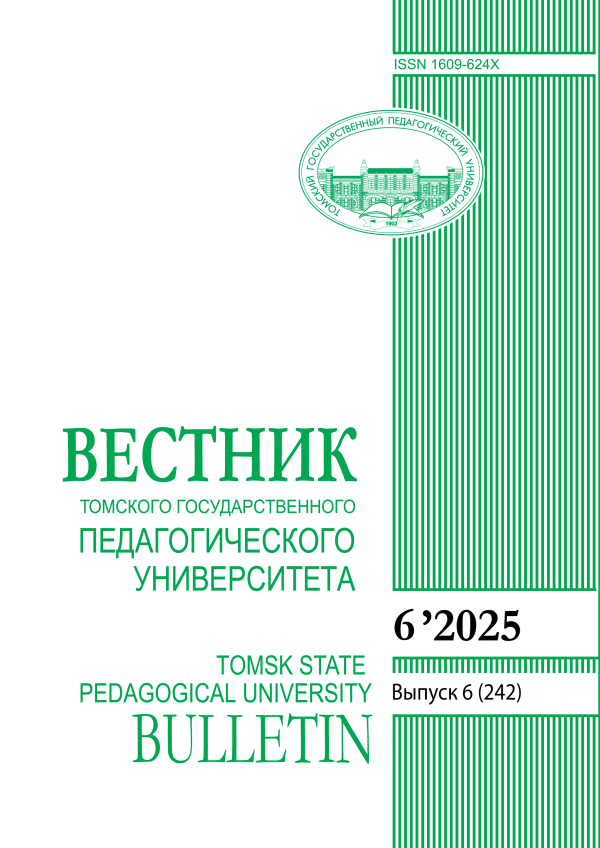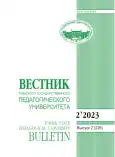Условия формирования языковой среды в высших учебных заведениях с целью межкультурного и профессионального развития студентов нелингвистических направлений подготовки
- Авторы: Шульгина Е.М.1, Савицкая И.С.1, Житкова Е.В.1
-
Учреждения:
- Национальный исследовательский Томский государственный университет
- Выпуск: № 2 (2023)
- Страницы: 70-76
- Раздел: ПРОБЛЕМЫ ВОСПИТАНИЯ
- URL: https://bakhtiniada.ru/1609-624X/article/view/269028
- DOI: https://doi.org/10.23951/1609-624X-2023-2-70-76
- ID: 269028
Цитировать
Полный текст
Аннотация
Об авторах
Елена Модестовна Шульгина
Национальный исследовательский Томский государственный университет
Email: modestovna2@gmail.com
кандидат педагогических наук, доцент, зав. кафедрой пр. Ленина, 36, Томск, Россия, 634050
Ирина Семеновна Савицкая
Национальный исследовательский Томский государственный университет
Email: sais.08@mail.ru
старший преподаватель кафедры английской филологии пр. Ленина, 36, Томск, Россия, 634050
Елена Викторовна Житкова
Национальный исследовательский Томский государственный университет
Email: eshi@inbox.ru
кандидат педагогических наук, доцент пр. Ленина, 36, Томск, Россия, 634050
Список литературы
- Crichton S., Carter D. Taking Making into the Schools: An Immersive Professional De-velopment Approach // Handbook of Research on Teacher Education in the Digital Age. Hershey PA: Information Science Reference. 2015. Р. 412–438. https://doi.org/10.4018/978-1-4666-8403-4.ch016
- Macintyre L., Crichton S. Innovation’s Renewing Potential: Seeing and Acting Mindfully Within the Fecundity of Educative Experiences // Education & Culture. 2015. Vol. 31 (2). Р. 27. https://doi.org/10.1353/eac.2015.0010
- Petrova G., Medvedeva L., Nadezhdina E. The distance education better meets the idea of lifelong learning education, self-conducted education in modern society // Proceedings of the Middle-Term Conference RC04 Sociology of Education International Sociological Association (ISA). p. RUDN University. Moscow, 2019. Р. 599–606. https://doi.org/10.22363/09669-2019-599-606
- Томские университеты будут «укреплять друг друга» в рамках государственной программы «Приоритет 2030». URL: https://www.riatomsk.ru/article/20210330/vuzi-tomska-gosprogramma-prioritet-2030 (дата обращения: 03.01.2021).
- Wulandari W., Noor A. Foreign Language Learning, Environment, and their Influence on Moslem Teenage Learners’ Identity // The 5th International Conference on Energy, Environ-mental and Information System (ICENIS 2020). 2020. Vol. 202. https://doi.org/10.1051/e3sconf/202020207043
- Бодалев А. А., Васина Н. В. Акмеология: Настоящий человек. Каков он и как им становятся. СПб.: Речь, 2010. 224 с.
- Деркач А. А., Зазыкин В. Г., Маркова А. К. Психология развития профессионала: учеб. пособие. М.: РАГС, 2000.
- Obdalova O. Content-Based EFL Teaching to Undergraduate Science Students: A Dis-course Perspective // Examining Content and Language Integrated Learning (CLIL) Theories and Practices. IGI Global. 2020. Р. 208–225. https://doi.org/10.4018/978-1-7998-3266-9.ch012
- Sağlam G., Sali P. The Essentials of the Foreign Language Learning Environ-ment: Through the Eyes of the Pre-service EFL Teachers // Procedia – Social and Behavioral Sciences. 2013. № 93. Р. 1121–1125. https://doi.org/10.1016/j.sbspro.2013.09.342
- Hanifah U., Rakhmawati I. The Prominence of Creating Language Environment in Devel-oping Arabic and English Speaking Skills in Islamic Universities. Proceedings of the Inter-national Conference on English Language Teaching (ICONELT 2019) // Advances in Social Science, Education and Humanities Research. 2020. Vol. 434. Р. 271–273. https://doi.org/10.2991/assehr.k.200427.054 (accessed 26.12.2021).
- Obdalova O., Minakova L., Soboleva A. Developing academic skills via Greek and Latin vocabulary teaching. Lecture Notes in Networks and Systems // Proceedings Intergrating Engineering Education and Humanities for Global Perspectives, Springer Nature, Switzer-land, 25–27 March 2020, St. Petersburg, Russia. 2020. Vol. 131. Р. 376–386. https://doi.org/10.1007/978-3-030-47415-7
- Юкико И. B. «Международный бакалавриат» в Японии и Азии // Международное высшее образование. 2019. № 96. С. 25–27.
- Global Education Monitoring Report 2016, Education for People and the Planet, Creating Sustainable Futures for All. Homepage. URL: http://unesdoc.unesco.org/images/0024/002457/245752e.pdf (дата обращения: 26.12.2021).
- Shulgina E., Savitskaya I., Mitchell P. Academic conferences as a tool for language skills development in non-language majoring university students // Advances in Intelligent Systems and Computing. 2019. № 907. Р. 224–236. https://doi.org/10.1007/978-3-030-11473-2_25
- Синьянь Л. Государственная политика и роль английского языка в высшем образовании // Международное высшее образование. 2019. № 96. С. 20–22.
- Martin Heidegger. Sein Und Zeit: Gesamtausgabe: 1 Abteilung: Veroffentlichte Schriften 1914–1970. German Edition. Band 2. Verlag Vittorio Klosterman, 2018.
Дополнительные файлы







